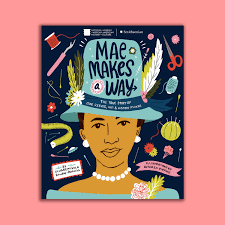Ruffly skirts and puffy sleeves! Fussy frills and rows of ribbons! Grandma Lula dressed little Mae all fancy, like a tiny doll. Mae didn’t want to be a doll. She wanted to go outside and play in the dirt! But in those fancy clothes, Mae told a beautiful story. She offered hope during hard days.
By the early 1900s, when Mae was a girl, slavery had officially ended in the United States. But new segregation laws kept Black people apart and unequal. Instead of liberty and justice, Black citizens like Mae and her family faced violence and oppression. Little Mae in her ruffles and ribbons brought joy in the midst of much suffering.
Mae’s small hometown was in the segregated South. Vidalia, Georgia, did not have many opportunities for Black families to live their best lives and do what they dreamed. But as Mae grew, she made her own ways to have fun. At school, Mae wrote plays and she was also the director and star. She designed and sewed fancy clothes for her dolls. Mae made joys, but sorrow came. Mae’s parents died when she was only fourteen, and she and her younger siblings went to live with her grandmother.
Comprehension Questions
1. Who dressed little Mae like a doll?
A. Grandma Ruby
B. Grandma Lulu
C. Mama
A. They wanted a change of scenery.
B. They got in too much trouble.
C. Their parents died.
Your Thoughts
Vocabulary
4. List any vocabulary words below.

